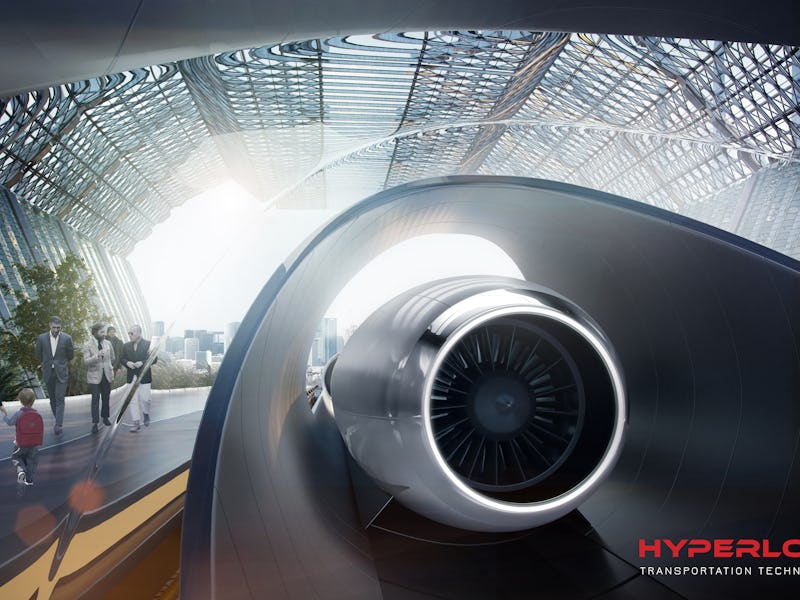
Hyperloop Transportation Technologies wants to break into India and the Middle East — or at least it’s started the paperwork. And so far, paperwork is pretty much all HTT has. HTT filed a letter of intent with India’s transportation minister to express interest in conducting hyperloop tests within the country, and the company has also entered an agreement with Abu Dhabi, the capital of the United Arab Emirates, to conduct feasibility studies for its futuristic cargo and commuter transit system.
The hyperloop concept was originally published by Tesla CEO Elon Musk in 2013. It’s kind of like the vacuum system used at drive-through banks: passengers would sit in oblong pods that move at high speeds through specially designed tubes. The hope is that hyperloop would make transportation faster — Musk said the system could let people commute between Los Angeles and San Francisco, a five-and-a-half hour drive, in just 30 minutes — and safer than getting around in automobiles.
Hyperloop Transportation Technologies is one of the most well-known companies working to make the hyperloop a reality, but its progress so far is confusing and not altogether convincing. The company is comprised mostly of volunteer workers who spend at least 10 hours a week on the project in exchange for stock options. The only full-time staff members are the ones raising money, working with regulators, and making sure the company stays in the headlines. Elon Musk isn’t affiliated with the project, but some Indian officials didn’t immediately realize that.
India’s transportation minister, Nitin Gadkari, initially confused Hyperloop Transportation Technologies COO Bibop Gresta with Musk. The mistake was only caught after Gadkari said he offered Tesla some land where it could test a hyperloop; Gresta tells Inverse the offer was actually made to his company.
“[Gadkari] was confused because everybody’s talking about ‘Elon Musk’s project’ even if Elon is not directly involved in any project,” Gresta tells Inverse. He says that Musk’s upcoming open competition to design the best hyperloop pod might help the company recruit more volunteer engineers. Otherwise, Musk has nothing to do with HTT.
Hyperloop Transportation Technologies is also working with Abu Dhabi on feasibility studies for its transit system. The company signed an agreement with the city’s regulators on November 21 to run the tests, and Gresta tells Inverse that Abu Dhabi is likely to be the first city in the world to allow a hyperloop system to finally work with with human passengers, though he says this probably won’t happen until 2018 or 2019.
“Right now if I would bet which [country] would give us the first ‘go’ to build it would be Abu Dhabi,” Gresta says. “Don’t quote that I already have that permission because it’s not true. but let’s just say that’s what I hope.”
But these projects depend on Hyperloop Transportation Technologies working with regulators and other companies. There has been some trouble there in the past: The company was supposed to break ground on a hyperloop project in Quay Valley, California in 2016 but construction has yet to begin, because the developers haven’t filed all the necessary paperwork with local agencies.
Gresta tells Inverse that he expects work on the Quay Valley project to begin in earnest by February 2017. That’s long after the company announced its plans, and depends on the local regulators approving the final paperwork, which can reportedly take anywhere from six months to several years after everything is submitted. Launching in February would be hard.
“We don’t know if we’ll receive the permit by February,” Gresta says. “And honestly we aren’t waiting for the American government. If this doesn’t happen, the world is moving forward anyway, and other countries are willing to help us not only with land but also with other contributions.”
It’s worth keeping this in mind as Hyperloop Transportation Technologies announces plans to debut in other countries. Unless the regulators in those countries are more supportive than those in California, we’re unlikely to see a hyperloop in them any time soon, despite the fact that the company claims to be interested in finally testing its volunteer-designed concepts for the technology.